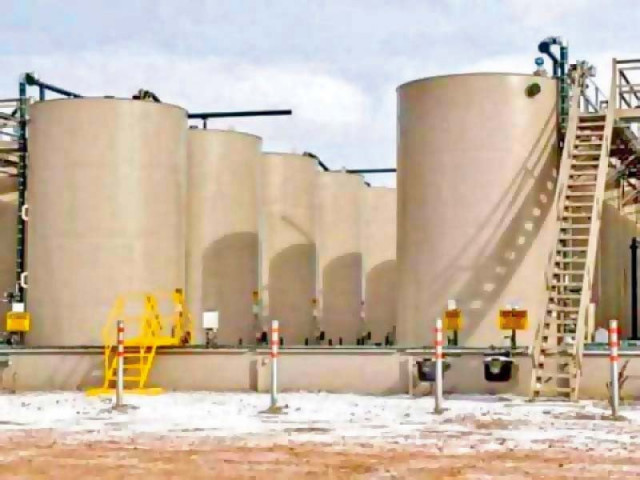SBP fails to set up $400m oil fund
Thin forex reserves hamper move amid warning diesel stocks may dry up

The State Bank of Pakistan (SBP) has shown its inability to set up a $400 million fund or make advance payments for smooth oil imports due to the thin foreign exchange reserves amid the Petroleum Division’s warning that diesel stocks may dry up late next month.
The Petroleum Division had sought the central bank’s intervention after foreign banks started demanding up to 8% confirmation charges on the letters of credit (LCs) for oil imports due to Pakistan’s low credit rating and the talk of default.
Normal rate is around 0.5%. Local banks were not able to open LCs due to the same reasons.
Sources said that a meeting between the Petroleum Division and the SBP remained inconclusive this week that had been convened to find a solution to the difficulties being faced by the oil importers.
The central bank showed its inability to immediately provide any relief due to the shrinking foreign exchange reserves, they added.
Most of the companies were unable to get permission for the required crude oil imports besides the high cost of confirmation, leading to the low reserves of petroleum products, particularly diesel.
The petroleum secretary made it clear in the meeting that if Pakistan continued to operate with such limited LCs and banking lines, then a shortage of petroleum products would be “imminent”, according to the sources. Such a situation would affect the transport, agriculture, industry and power sectors, they said.
It was discussed that the situation was more critical for the diesel supply chain and while the country’s production and imports seemed to be sufficient for November, “the non-confirmation of LCs may result in dry out in the later part in December 2022”. That could create panic and cause collapse of the whole economy, said the Petroleum Division officials.
The SBP governor was told that a limited number of LCs was being confirmed at an exorbitant rate of up to 8%, which was contributing to higher prices of petroleum products in the country.
The Petroleum Division proposed that the central bank may make advance payments for a limited time period to the reputable and government-owned suppliers from the Gulf countries aimed at saving the LC confirmation cost.
Sources said that the Petroleum Division also proposed that a Nostro account having $300 million to $400 million may be opened to provide cash security, which could be withdrawn in case of default on an LC. But no final decision was made by the central bank.
The SBP was of the view that despite the difficult circumstances, it was still facilitating oil imports and as a result the imports reached $7.6 billion, or one-third of the total imports, in the July-October period.
“Pakistan has a limited payment capacity,” remarked the central bank chief in the meeting, according to the sources.
The SBP governor expressed his inability to make advance payments because of a very limited payment capacity and the increasing pressure of reduced exports and remittances.
Similarly, the central bank chief said that the opening of the $400 million fund was similar to making advance payments as the amount would move out of the SBP’s reserves into an account outside of the country.
The SBP would now consult with the Ministry of Finance to see whether there was still the possibility to set up the fund, according to a participant of the meeting. It was also of the view that advance payments to the oil sector would create a precedent for other sectors to follow.
The federal government and the SBP have massively curtailed imports through administrative measures and the non-tariff barriers. But economic activities have been severely affected. Foreign exchange reserves also stand low at only $7.8 billion.
Sources said that the SBP desired that the federal government should consider importing oil under a government-to-government deal to avoid higher costs, including seeking funds from the Islamic Development Bank (IDB) under a trade financing facility.
However, the Petroleum Division responded that there were remote chances of striking a government deal. Also, the Ministry of Finance clarified that the IDB was facing similar problems in arranging funds due to the downgrading of the country’s credit rating and currently it was not likely to get financing from the ITFC.
Owing to the low crude oil imports, Pakistan may run short of refined products. The central bank has been warned that in case of low imports, Pakistan will not have any option but to import refined products, which will cost more.
At least $17 million more will be required per cargo at the existing prices compared to the crude oil imports, according to the sources.
The SBP was cautioned that in case of any disturbance in the oil import cycle, it would take a minimum of three months to revive it.
Published in The Express Tribune, November 25th, 2022.
Like Business on Facebook, follow @TribuneBiz on Twitter to stay informed and join in the conversation.



















COMMENTS
Comments are moderated and generally will be posted if they are on-topic and not abusive.
For more information, please see our Comments FAQ